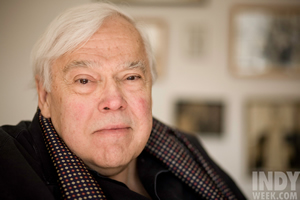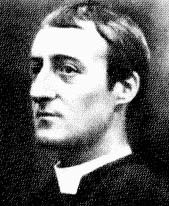The Perfect Life for Imperfect People:
"Be Merciful"
For Sunday February 13, 2011
Lectionary Readings (Revised Common Lectionary, Year A)
Deuteronomy 30:15–20
Psalm 119:1–8
1 Corinthians 3:1–9
Matthew 5:21–37
"Choose life!"
Just two little words from Deuteronomy 30:19. They sound so simple. The Deuteronomist even says that the choice between life and death, blessing and curses, is "not too difficult for you or beyond your reach" (30:11). The apostle Paul makes a similar appeal to wealthy Christians: "Take hold of the life that is truly life" (1 Timothy 6:19). And then there's Jesus, who says, "I've come that you might have life, and have it abundantly" (John 10:10).
These words sound simple, but our human experience proves otherwise. After all, we're only "poor creatures, now a wonder / a wonder tortur'd in the space / betwixt this world and that of grace" (Herbert). In the most mysterious book of the Bible, Ecclesiastes, Qoheleth describes his search for true life. He pursued all the obvious pathways — intellectual study, work, every imaginable pleasure, civic projects, and even righteousness itself. In the end, it all felt like chasing after the wind, a meaningless "futility of futilities."
 |
Reynolds Price (1933-2011). |
But living like "mere mortals" is precisely what Christians are called to transcend. In the epistle for this week, Paul chides the Corinthians for their jealously and quarrels. Those are signs, says Paul, that they're living in a "worldly" rather than a "spiritual" manner. They're acting in an "infantile" rather than a mature way, he says, "like mere men" (1 Corinthians 3:1–9). Similarly, Jesus observes that there's nothing unusual about loving those who love you. No one should expect a reward for that sort of behavior: "even the tax collectors do that." That's like greeting a close friend or a family member: "Even pagans do that" (Matthew 5:46–47).
Jesus contrasts living like a pagan or a tax collector with living life in his kingdom. He gives five examples from the Old Testament: murder, adultery, oaths, retribution, and treatment of your enemies. With each example Matthew repeats the identical refrain: "You have heard it said, but I say" (Matthew 5:21, 27, 33, 38, 43). Jesus says that he didn't come to abolish the law but to fulfill it, to broaden and deepen it from mere outward ritual or external compliance to an interior transformation. But any way you look at it, he's calling us to a way of life radically different from that of what Paul calls "mere men," and even beyond the ethics of the Old Testament law.
Instead of living like a pagan (5:47), Jesus demands perfection: "Be perfect, as your heavenly father is perfect" (5:48).
Perfection? For mere mortals? That sounds ideal, but isn't it impossible? Isn't the quest for perfection the voice of the oppressor? Doesn't perfectionism lead to self-righteousness, a need to be right and to be seen as right? Doesn't it tempt us to edit our real but fallen selves and instead to project a false and sanctimonious self — to our own selves and to others? The former president Jimmy Carter was mocked for admitting in a Playboy interview that he struggled with "lust in his heart" (based upon this gospel text), but that was just an honest admission that, like all of us, he was far from perfect.
The key to this conundrum is in Luke's parallel passage. I wonder if Luke was shocked by Matthew's prescription for perfection. Luke's shorter version of the same material makes several editorial changes. Whereas Matthew has a "sermon on the mount" (Matthew 5:1), Luke presents a "sermon on the plain" (Luke 6:17). The most shocking difference is how Luke concludes the passage. Matthew writes, "be perfect, as your heavenly Father is perfect" (Matthew 5:48), which echoes Leviticus 19:2: "Be holy because I, the Lord your God, am holy." Luke makes a single but remarkable word change, "be merciful, just as your heavenly father is merciful" (Luke 6:36).
No one can be perfect, but everyone can show mercy. And in showing mercy we approach divine perfection. The novelist Reynolds Price (1933-2011) of Duke University, who died on January 20, was an outspoken if unorthodox and non-churchgoing Christian. He once told the Georgia Review (1993), "The whole point of learning about the human race presumably is to give it mercy."
To live a life of divine perfection, show mercy to your neighbor. Showing mercy, both Matthew and Luke agree, is precisely what God does. He causes the sun to rise on the good and the evil. He sends rain for the righteous and the unrighteous (Matthew 5:45). God is kind to the wicked and ungrateful (Luke 6:35).
Or consider Matthew's five examples. Divorce is understandable, at times even necessary, for some people inevitable, but what might happen if spouses extended mercy to each other? Avoiding murder is not much to brag about, but moving from anger to mercy sure is. Retaliation is tempting, and retribution is part of our legal system, but mercy forgives and forgets. States and governments protect their self-interests by hating their enemies, but Jesus calls us to love our enemies.
And here's an even more radical idea — extend this divine mercy to your own self, for that's what God has already done.
 |
Gerard Manley Hopkins (1844–1889). |
Much of the poetry of Gerard Manley Hopkins (1844–1889) is characterized by darkness and despair, reflecting his lifelong interior struggles. Hopkins was born and raised in England, then educated at Oxford. After converting to Catholicism in 1868, which estranged him from his Anglican family, he promptly burned much of the poetry he had written and even stopped writing for seven years. After ordination as a Jesuit priest in 1877, an assignment in Ireland left him feeling isolated and melancholy, thus giving rise to his so-called "terrible sonnets" like I Wake and Feel the Fell of Dark.
But somewhere in his darkness, Hopkins experienced God's light. Somehow he moved beyond self-reproach to divine mercy. In one of my favorite poems, My Own Heart, he portrays an interior conversation about extending mercy to himself and accepting "God's smile" upon his life.
My own heart let me more have pity on; let
Me live to my sad self hereafter kind,
Charitable; not live this tormented mind
With this tormented mind tormenting yet.
I cast for comfort I can no more get
By groping round my comfortless, than blind
Eyes in their dark can day or thirst can find
Thirst's all-in-all in all a world of wet.Soul, self; come, poor Jackself, I do advise
You, jaded, let be; call off thoughts awhile
Elsewhere; leave comfort root-room; let joy size
At God knows when to God knows what; whose smile
's not wrung, see you; unforseen times rather — as skies
Betweenpie mountains — lights a lovely mile.
On his death bed with typhoid at the age of forty-four, Hopkins' last words were, "I am so happy. I am so happy. I loved my life." That's the sort of perfection of mercy in an imperfect person for which we should all hope.
For further reflection
Edwina Gateley
Let Your God Love You
Be silent.
Be still.
Alone.
Empty
Before your God.
Say nothing.
Ask nothing.
Be silent.
Be still.
Let your God look upon you.
That is all.
God knows.
God understands.
God loves you
With an enormous love,
And only wants
To look upon you
With that love.
Quiet.
Still.
Be.
Let your God —
Love you.
Image credits: (1) IndyWeek.com and (2) County Kildare Community Notebook.





